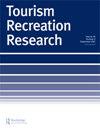An empirical investigation of the effects of entrance fees on national park visitors
IF 3.4
Q1 HOSPITALITY, LEISURE, SPORT & TOURISM
引用次数: 0
Abstract
ABSTRACTThe budget reduction to public lands in the U.S. press parks to generate own revenues. Implementing entrance fees is considered by park management, but there is controversy surrounding the potential impacts on visitation and revenue. Drawing insights from the zero-price effect and the transactional utility theory, this study conducted two separate written vignette experiments targeting different populations to examine the effects of entrance fees on national park visitors’ experiences and behavioural intentions. Participants in each experiment were randomised to one of the three entrance fee conditions. They then read a written vignette describing a visit to a national park and completed a series of survey questions regarding their park experience and behavioural intentions. A total of 272 and 279 responses was gathered in each experiment, respectively. The results revealed that entrance fees do not influence satisfaction. However, the effects of entrance fees on perceived price value and behavioural intentions were found to be mixed. Theoretical and practical implications were discussed.KEYWORDS: Pricingentrance feezero-price effecttransactional utilitywritten vignette experimentnational parks Disclosure statementNo potential conflict of interest was reported by the author(s).Notes1 We performed the same series of two-way ANOVA with Study 2 sample, and no significant effect was found across the three ANOVA models. Additional informationNotes on contributorsHyunseo (Violet) YoonHyunseo (Violet) Yoon, Ph.D. is an Assistant Professor in the Department of Recreation, Tourism and Therapeutic Recreation at Winona State University. Her primary research interest is to use virtual environments to enhance tourism benefits.Suiwen (Sharon) ZouSuiwen (Sharon) Zou, Ph.D. is an Assistant Professor in the Department of Recreation, Sport and Tourism at the University of Illinois Urbana-Champaign. Her research focuses on marketing practices that address the financial issues of tourism and leisure services.国家公园门票对游客影响的实证研究
摘要美国新闻界削减公共土地预算以产生自己的收入。公园管理部门考虑实施门票收费,但围绕对游客和收入的潜在影响存在争议。借鉴零价格效应和交易效用理论的见解,本研究针对不同人群进行了两个单独的书面小插图实验,以检验入场费对国家公园游客体验和行为意图的影响。每个实验的参与者都被随机分配到三种入场费条件中的一种。然后,他们阅读了一篇描述参观国家公园的书面小短文,并完成了一系列关于他们的公园体验和行为意图的调查问题。每次实验分别收集了272份和279份问卷。结果显示,入场费不影响满意度。然而,入场费对感知价格价值和行为意图的影响是混合的。讨论了理论和实践意义。关键词:定价、入场费、零价格效应、交易效用、书面小品、实验性国家公园披露声明作者未发现潜在的利益冲突。注1我们对研究2的样本进行了相同系列的双向方差分析,三个方差分析模型之间没有发现显著的影响。作者简介:Yoon hyunseo (Violet) Yoon博士是威诺那州立大学娱乐、旅游和治疗娱乐系的助理教授。她的主要研究兴趣是利用虚拟环境来提高旅游效益。邹穗文(Sharon)邹穗文,博士,伊利诺伊大学香槟分校娱乐、体育与旅游系助理教授。她的研究重点是解决旅游和休闲服务的财务问题的营销实践。
本文章由计算机程序翻译,如有差异,请以英文原文为准。
求助全文
约1分钟内获得全文
求助全文
来源期刊

Tourism Recreation Research
HOSPITALITY, LEISURE, SPORT & TOURISM-
CiteScore
11.30
自引率
7.10%
发文量
77
期刊介绍:
Tourism Recreation Research is a multidisciplinary international journal now published quarterly; it focuses on research problems in various tourism and recreational environments — ecological, economic, and socio-cultural — and attempts to seek solutions for sustainable development. Contributions are also encouraged on fundamental research concepts and theories. The journal carries regular features such as Research Note, Post-Published Reviews and Book Reviews. The ‘Research Note’ provides opportunity for scholars who have attained sufficient maturity to establish reliable findings in their field of research. The ‘Post-Published Review’ section has been introduced to capture deep insights into the papers that have already been published in Tourism Recreation Research to fill in gaps in the received information. Strong emphasis is laid on original research and readable prose.
 求助内容:
求助内容: 应助结果提醒方式:
应助结果提醒方式:


